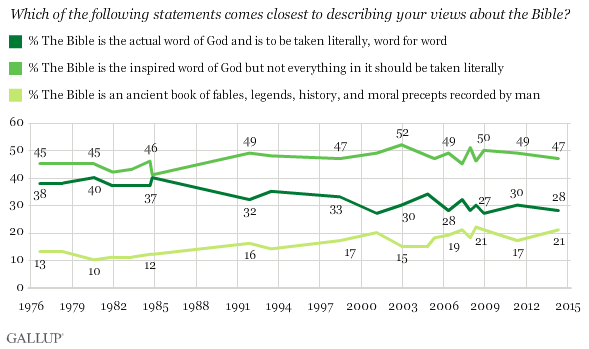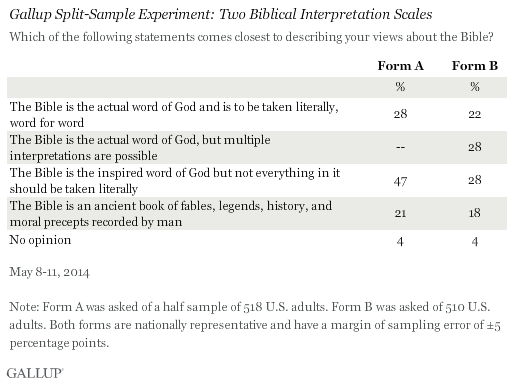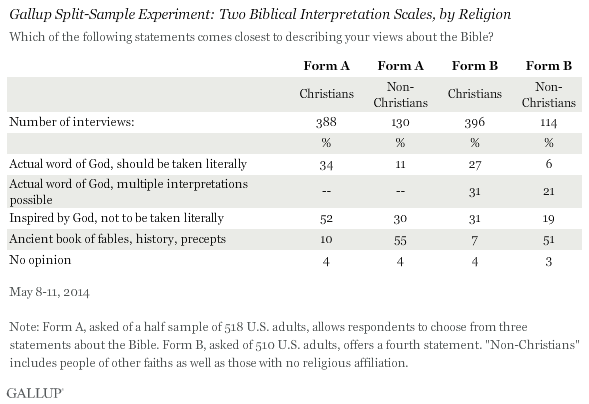PRINCETON, NJ -- Twenty-eight percent of Americans believe the Bible is the actual word of God and that it should be taken literally. This is somewhat below the 38% to 40% seen in the late 1970s, and near the all-time low of 27% reached in 2001 and 2009. But about half of Americans continue to say the Bible is the inspired word of God, not to be taken literally -- meaning a combined 75% believe the Bible is in some way connected to God. About one in five Americans view the Bible in purely secular terms -- as ancient fables, legends, history, and precepts written by man -- which is up from 13% in 1976.

The latest results are from Gallup's 2014 update of its annual Values and Beliefs poll, conducted May 8-11.
Fittingly, overall acceptance of the Bible as being divinely written or inspired closely approximates the proportion of Americans identifying themselves as Christian: 76% in Gallup's 2013 religion aggregate. Meanwhile, the 21% viewing the Bible in secular terms nearly matches the combined 22% who identify with another religion or no religion.
Parsing the Debate Over Biblical Interpretation
Gallup's long-standing trend question on biblical interpretation touches on two ongoing debates in Christian theology. One is about whether the words of the Bible came directly from God -- essentially using the writers as scribes -- or if they are the words of men, but guided by divine inspiration. The other debate involves the meaning of the words: whether they should be taken literally, or be viewed partly -- or merely -- as metaphors and allegories that allow for interpretation.
To help clarify where the non-literal believers stand on God's role in the Bible, Gallup asked half of respondents in the new poll a different question that offered a fourth choice: saying the Bible is the actual word of God, but with multiple interpretations possible.
In response to this four-part question, 22% of Americans say the Bible is the actual word of God, to be taken literally -- a bit lower than when using the three-part question. Twenty-eight percent believe it is the actual word of God, but with multiple interpretations possible.
Another 28% say the Bible is the inspired word of God but should not be taken literally. Eighteen percent say it is an ancient book of fables, legends, history, and moral precepts written by man.

Although the smaller sample sizes associated with the split-sample results do not allow for in-depth review by subgroup, it is important to note that at least nine in 10 Christians believe the Bible is connected in some way to God, regardless of the response options.
Also, by 58% to 34%, Christians are significantly more likely to indicate they believe the Bible is the actual word of God when given the additional option of saying "the Bible is the actual word of God, but multiple interpretations are possible" than when only having the option of saying "the Bible is the actual word of God and is to be taken literally, word for word." This could be an important indicator of the depth of U.S. Christians' devotion to the Bible.

Bottom Line
The Bible is the central text in Christianity, the dominant religion in the U.S., and parts of it are also relevant to followers of Judaism and Islam, thus giving it enormous cultural significance. Despite some evidence that Americans are becoming more detached from formal religion, the vast majority of Christians, and therefore of Americans, still view the Bible as God's word. The 28% adhering to biblical literalism in the trend question is down about 10 percentage points since the late 1970s. But that decline mainly occurred in the 1980s and 1990s. Ever since, the figure has varied between 27% and 34%, with the current 28% on the low end of that range.
While the long-standing Gallup trend shows biblical literalism as ebbing, the new question indicates that the percentage of Americans taking the Bible literally is even lower, at 22%, when respondents are offered more alternatives. Still, the 78% who agree with one of the three statements linking God's word to the Bible using the four-part question nearly matches the 75% choosing one of the two statements affirming God's role in the three-part question -- underscoring the validity that three in four Americans consider the Bible holy to some degree.
Ultimately, the finding that nine in 10 Christians believe the Bible emanates from God indicates that U.S. Christians are Christian in more than name only.
Survey Methods
Results for this Gallup poll are based on telephone interviews conducted May 8-11, 2014, with a random sample of 1,028 adults, aged 18 and older, living in all 50 U.S. states and the District of Columbia.
For results based on the sample of 518 national adults in Form A, the margin of sampling error is ±5 percentage points. For results based on the sample of 510 national adults in Form B, the margin of sampling error is ±5 percentage points.
Interviews are conducted with respondents on landline telephones and cellular phones, with interviews conducted in Spanish for respondents who are primarily Spanish-speaking. Each sample of national adults includes a minimum quota of 50% cellphone respondents and 50% landline respondents, with additional minimum quotas by time zone within region. Landline and cellular telephone numbers are selected using random-digit-dial methods. Landline respondents are chosen at random within each household on the basis of which member had the most recent birthday.
Samples are weighted to correct for unequal selection probability, nonresponse, and double coverage of landline and cell users in the two sampling frames. They are also weighted to match the national demographics of gender, age, race, Hispanic ethnicity, education, region, population density, and phone status (cellphone only/landline only/both, and cellphone mostly). Demographic weighting targets are based on the most recent Current Population Survey figures for the aged 18 and older U.S. population. Phone status targets are based on the most recent National Health Interview Survey. Population density targets are based on the most recent U.S. census. All reported margins of sampling error include the computed design effects for weighting.
In addition to sampling error, question wording and practical difficulties in conducting surveys can introduce error or bias into the findings of public opinion polls.
View survey methodology, complete question responses, and trends.
For more details on Gallup's polling methodology, visit www.gallup.com.
